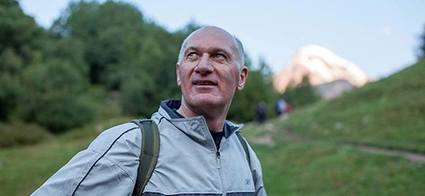Nobel Prize for Literature Nominee, Kanta Ibragimov: On War and Friendship
For the second time, Chechen writer Kanta Ibragimov has been included in the list of official nominees for the Nobel Prize for Literature. Kanta Ibragimov was already nominated for the Nobel Prize in 2010 for his novel ‘Children’s World.‘
Georgia Today got the unique chance to meet the Nobel Nominee.
Q. Mr. Ibragimov, you literally burst into the literature world relatively recently, immediately becoming the new discovery for creative writing lovers in many countries. Before that you were a scientist with international recognition and a very successful business. What prompted you to become a writer?
A: The blessing of literary work, I received from my father, but it was war that forced me to take up the pen and start writing. Actually, I’d had a dream to become a writer since I was a child, especially after well-known writers visited our school. I was appalled by how and what they told us, how they were reading their poems. And their books! It was back then that I realized one day I wanted to hold a book in my hands which had been written by me. I even promised my grandfather that I would write a book about him, but all family members were scientists. Father had a Ph.D. in chemistry; he was a professor and academician. He wanted his children to follow in his footsteps by dedicating themselves to the science and to achieve considerable success in that field. As a result, five members of my family have a PH.D. At the age of 37 I obtained a PH.D. in economics, I was a professor, I had my own business, and I had a favorable position. My father knew about my most sacred desire of becoming a writer. He told me: “If you have ideas, if you are able to write, then write!” Times were hard and we needed the money to sustain our large family. But my father insisted: “If you distance yourself from literature, and devote all your time to business, you won’t be able to go back!” So I gave up the fight. The war at the end of 20th century brought unspeakable tragedy to my nation. I had the feeling that I should write the truth about this war and about Chechens who were indiscriminately labeled as criminals. I also had to keep my promise to my grandfather. He had a very difficult fate; he went through unthinkable hardships, including Kolyma. I dedicated my first novel to him ‘Past War.’ In my mind the plan for the second novel was already born ‘Gray Caucasus,’ and again it was mostly about the war. Frankly speaking, I thought that I would write several books about the issues which were the most painful for me, which would show that Chechens are no worse or better than others. I only write on paper. It is absolutely different from typing on the computer; livelier, more soulful, that’s why you feel that you and your composition are part of one whole.
Q. In Georgia there are many admirers of your talent, two of your books have been published in Georgia ‘Tale of East’ and ‘Stigal.’ We know that a third novel ‘Children’s World’ is being prepared for publishing. How will you please your Georgian readership this time?
A. This novel is most sacred for me, most touching and most actual because this novel is about the children in war. In my novel is a boy asking the mute question: “Why is everyone beating us and shooting at us?” He lives surrounded by the smell of death and war, where a child’s world is painted in dark colors. Meanwhile, the boy is exceptionally talented in music; he is composing an anthem for peace for the new children’s world. Unable to cope with the hell of war, he takes a step torwards this other world. Children should not be aware of war. Unfortunately, they are. All over the world they know about it and adults are the ones who should be blamed for letting this happen.
Q. There are many things which connect you with our country. You are the only foreigner to be a member of the committee of the National Academy of Sciences of Georgia. Tell us about your plans connected with Georgia.
A. Can I firstly confess my love for this amazing country; Georgia? After all, mutual affection between Georgian and Chechen people was born not today but tested for centuries. Affection, friendship, love, respect, as well as cultural and scientific connections, all these constitute only small part of the mutual relations between our nations. I have plans to do everything in order to strengthen those cultural, literary, and scientific connections that have been recently weakened. Work in this direction has already started. Our frequent guest is the director of the Center for the Study of Problems in the Complex Development of Georgia (at the Ivane Javakhishvili Tbilisi State University), Doctor of Political Sciences, Levan Metreveli. The outcome of our meetings is the signing of agreements regarding cooperation between Tbilisi State University and Chechnya State University, also between The Georgian National Academy of Sciences and Academy of Sciences of the Chechen Republic, which includes exchange programs and joint scientific research in the fields of philology, history, culture and literature. Mr Metreveli and I are planning to establish a Georgia-Chechnya community of friendship to allow the exchange of experience regarding scientific-creative activities in the fields of culture, literature, history and science. I also plan to establish close relations with the Union of Writers of Georgia with the aim of creative exchanges and for the translation of literary works. Georgia is an ancient, developed, beautiful country, and we have a lot to learn and to adopt.
Q. You are actively engaged in public activities. Tell us a little about it.
A. My main task at present is participation in the organizational committee of the Year of Literature in Russia which includes the organization of different events, book fairs, meetings with writers and the public, helping young writers and so on. In particular, right now we are preparing for the 85th anniversary of the Union of Writers of the Chechen Republic. Notably, we are also planning events connected with the 200th anniversary of outstanding painter Petr Zakharov-Chechenec. This is my topic- I’m involved in it both as a writer and as a public figure. As a writer I already published a book about the painter and am working on a second, as well as on a Catalogue-Album of the paintings of Zakharov with the expectation that next year will be announced the Year of Zakharov in our republic and the title of Zakharov returned to the museum of the republic as it was named after Zakharov before the military actions.His heritage belongs not only to the Chechen people, but to all Caucasia in general. A little orphan boy who should, in that situation, have died but survived- taken care of by a Georgian monk… He went on to become a well-known 19th century painter, earning the status of a free painter. He retained his identity; he did not reject his roots and he signed his paintings: ‘Chechen from the Dada-Urt’.’
I want to end with my love of Georgia, but this time with the words of Lermontov:
And before him a picture
Beauty blooming alive:
Georgia, luxurious valley
Carpets spread far;
Happy, lush end of the earth.
Dimitri Dolaberidze











